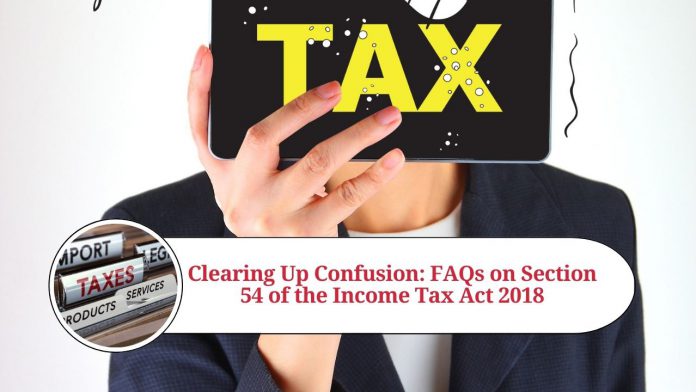Section 54 of Income Tax Act 2018: A Comprehensive Guide
Section 54 of the Income Tax Act 2018 provides relief to taxpayers who have sold their residential property and want to reinvest the proceeds in another property to save tax. This section provides exemptions on the capital gains made from the sale of a residential property if the proceeds are invested in another residential property. In this blog post, we will discuss the provisions of Section 54 of the Income Tax Act 2018 in detail.
What is Section 54 of the Income Tax Act 2018?
Section 54 of the Income Tax Act 2018 deals with the exemption of capital gains on the sale of a residential property if the proceeds are invested in another residential property. This provision applies to individuals, HUFs (Hindu Undivided Families), and other taxpayers who have sold their residential property and want to reinvest the proceeds in another residential property.
Conditions for availing the benefit of Section 54
To avail the benefits of Section 54 of the Income Tax Act 2018, the following conditions must be fulfilled:
- The capital gains should arise from the sale of a residential property.
- The taxpayer should purchase another residential property within two years of the sale of the first property. If the taxpayer constructs a new residential property, the construction should be completed within three years of the sale of the first property.
- The cost of the new property should be equal to or higher than the capital gains realized from the sale of the first property.
- The taxpayer should not own more than one residential property, apart from the new property purchased or constructed.
- The taxpayer should not sell the new property within three years of its purchase or construction. If the new property is sold within three years, the capital gains exempted earlier would be added to the taxable income of the taxpayer in the year of sale.
Calculating the Exemption
The exemption under Section 54 is calculated as follows:
Exemption = Capital Gains x (Cost of New Property / Net Sales Consideration)
Here, “Capital Gains” means the gains made on the sale of the first property, “Cost of New Property” means the cost of the new property purchased or constructed, and “Net Sales Consideration” means the sale consideration received for the first property, less any expenses incurred on the sale.
For example, if a taxpayer sells a residential property for Rs. 50 lakh and makes a capital gain of Rs. 20 lakh, and then purchases a new residential property for Rs. 70 lakh, the exemption under Section 54 would be calculated as follows:
Exemption = 20,00,000 x (70,00,000 / 50,00,000) = Rs. 28,00,000
Conclusion
Section 54 of the Income Tax Act 2018 provides a significant relief to taxpayers who have sold their residential property and want to reinvest the proceeds in another residential property. By fulfilling the conditions mentioned under this section, taxpayers can save a considerable amount of tax on the capital gains realized from the sale of their first property. However, taxpayers must carefully analyze the provisions of this section and seek professional help if needed to ensure that they fulfill all the conditions and get the maximum benefit from this provision.
Other Related Blogs: Section 144B Income Tax Act
Frequently Asked Questions (FAQs)
Q: Who is eligible to claim the benefit of Section 54 of the Income Tax Act 2018?
A: Individuals, HUFs (Hindu Undivided Families), and other taxpayers who have sold their residential property and want to reinvest the proceeds in another residential property are eligible to claim the benefit of Section 54.
Q: What is the time limit for purchasing a new residential property to claim the exemption under Section 54?
A: The taxpayer should purchase another residential property within two years of the sale of the first property. If the taxpayer constructs a new residential property, the construction should be completed within three years of the sale of the first property.
Q: Is there a limit on the number of residential properties that a taxpayer can own to claim the benefit of Section 54?
A: Yes, the taxpayer should not own more than one residential property, apart from the new property purchased or constructed.
Q: Can the taxpayer sell the new residential property purchased or constructed under Section 54 within three years of its purchase or construction?
A: No, the taxpayer should not sell the new property within three years of its purchase or construction. If the new property is sold within three years, the capital gains exempted earlier would be added to the taxable income of the taxpayer in the year of sale.
Q: Can the taxpayer claim exemption under Section 54 for the capital gains made from the sale of a commercial property? A: No, the exemption under Section 54 is available only for the capital gains made from the sale of a residential property.
Q: How is the exemption calculated under Section 54 of the Income Tax Act 2018?
A: The exemption under Section 54 is calculated as follows: Exemption = Capital Gains x (Cost of New Property / Net Sales Consideration).
Q: Is it mandatory to reinvest the entire sale proceeds in a new residential property to claim the exemption under Section 54? A: No, it is not mandatory to reinvest the entire sale proceeds in a new residential property to claim the exemption under Section 54. The exemption is available on the capital gains realized from the sale of the first property, and the cost of the new property purchased or constructed should be equal to or higher than the capital gains realized from the sale of the first property.
Q: Can the taxpayer claim the benefit of Section 54 for a property purchased outside India?
A: No, the benefit of Section 54 is available only for a residential property purchased or constructed within India.




















